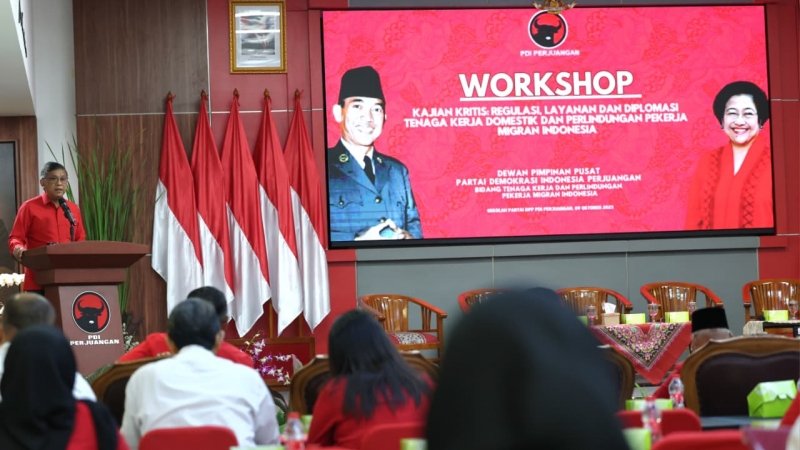The Chairperson of the Indonesian Democratic Party of Struggle (PDI-P), Megawati Soekarnoputri, has reaffirmed her commitment to protecting Indonesian Migrant Workers (PMI) who face unfair treatment abroad.
Megawati is even willing to personally intervene to provide protection for migrant workers. One example is the case of migrant workers in Russia that she handled directly to provide protection for Indonesian citizens.
This was conveyed during a workshop titled Critical Study: Regulations, Services and Diplomacy for Domestic Workers and Protection of Indonesian Migrant Workers, held in a hybrid format at the Party School in Lenteng Agung.
“Regarding the frequent problems faced by Indonesian Migrant Workers, Mrs. Mega directly intervenes. The most recent example is in Russia, where Mrs. Mega directly contacted the Russian Deputy Ambassador to Indonesia regarding the repatriation of Indonesian citizens,” the statement said.
Megawati continues to strengthen her commitment to protecting migrant workers by establishing the Labor and Indonesian Migrant Worker Protection Division within the Party structure for the 2025-2030 period.
Additionally, the former President also emphasized that the mechanism for repatriating migrant workers must be carried out quickly. Protection for migrant workers facing problems should not be delayed during the repatriation process.
“Mrs. Megawati emphasized that if there are problems, the repatriation process should not be delayed,” the statement added.
The message that Megawati consistently conveys to all PDI-P cadres throughout Indonesia and overseas leadership councils is to continue implementing Pancasila ideology as a guide in protecting Indonesian Migrant Workers.
“Implement Pancasila ideology as well as possible in protecting Indonesian workers. Because according to Pancasila ideology, our Constitution has stated and regulated that every citizen has equal rights before the law and government,” the message stated.
Direction of Labor Policy Transformation
A representative from the Ministry of Manpower outlined several main challenges in domestic labor.
These include unemployment and education-industry mismatch; dominance of the informal sector and weak social security; and the absence of specific legislation for domestic workers since the Domestic Workers Bill has not been ratified, resulting in weakened protection.
Furthermore, the impact of automation and digitalization in the world of work has reduced labor needs. “Labor public services and complaint mechanisms are not yet optimal, and service systems are not integrated for the informal sector,” the representative stated.
The representative also revealed the direction of national labor policy transformation. One of them is regulatory reform and protection for domestic workers, ranging from regulation preparation, expansion of social security, and labor public services.
“Improving the quality, skills, and dignity of domestic workers,” the representative explained.
In addressing domestic worker challenges, the representative said that strategies and collaboration that must be carried out by both government and society include cross-sector coordination and regional government coordination; participation of domestic worker organizations and NGOs; data integration and service digitalization; and of course, improving the functional capacity of employment facilitators, supervisors, and mediators.
Essentially, in solving domestic worker problems, transforming national labor policies is a step toward social justice.
“The Ministry of Manpower is committed to providing decent work, ensuring social protection, and improving the dignity and welfare of domestic workers,” the representative stated.
A human rights commissioner stated that every person has the right freely and without discrimination to obtain work that respects fundamental rights and human dignity.
As well as providing adequate income for themselves and their families, and ensuring security, physical and mental health, and safety.
“Including collective rights to associate, negotiate, and promote social protection,” the commissioner elaborated.
The Head of PDI-P’s Labor and Indonesian Migrant Worker Protection Division revealed several recommendations that her party could implement in providing protection for Indonesian workers, both domestic and migrant.
She stated that PDI-P needs to affirm its ideological position and present itself as a pro-worker party, as well as prepare an integrated Indonesian Labor and Migrant Protection Case Management System based on the party’s structure by forming party wings.
“Strengthening the capacity of party cadres and volunteers as companions and paralegals for the case management system, and performing integrative functions collaboratively across multiple stakeholders for advocacy,






